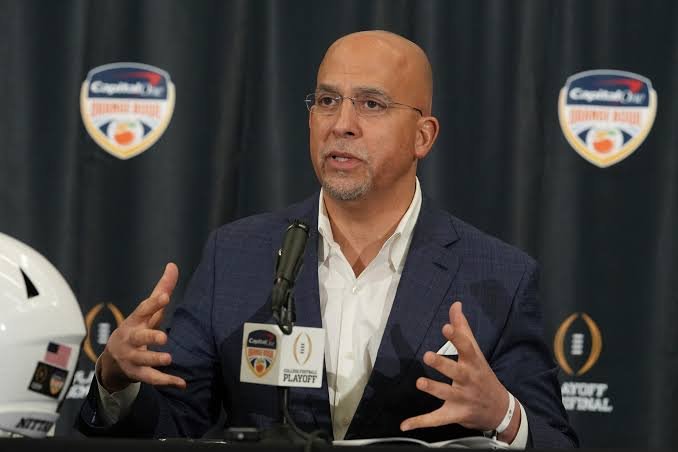“James Franklin Demands Radical Overhaul: ‘College Football Needs a Complete Shake-Up for a New Era!'”
Penn State Coach James Franklin Demands Radical Overhaul: “College Football Needs a Complete Shake-Up for a New Era!”
In a bold and surprising statement at a recent press conference, Penn State football head coach James Franklin called for a comprehensive overhaul of college football, arguing that the sport must evolve to keep pace with the changing landscape of athletics and the needs of its players. Franklin’s comments come on the heels of increasing scrutiny of college athletics, particularly with regard to player welfare, the impact of the NCAA’s rules, and shifting dynamics within the sport.
#### A Call for Change
Franklin, who has been at the helm of the Nittany Lions since 2014, expressed his concerns about the current state of college football, emphasizing that it’s time for a new approach. “We are at a crossroads,” Franklin declared. “Our game is more than just Xs and Os. It’s about the players, their well-being, and preparing them for life after football. If we don’t adapt, we risk losing the very essence of what makes college football special.”
His comments resonate in an era where athletes are becoming increasingly outspoken about their rights and experiences. From the push for fair compensation to mental health concerns, players are demanding more than just a scholarship; they are seeking a partnership that reflects their worth and contributions to the sport.
#### Player Welfare and Mental Health
One of Franklin’s major points of contention centers around the mental health of players. “The pressure to perform is immense,” he noted. “We need to ensure that our student-athletes have access to the mental health resources they need. It’s not just about the physical game anymore; it’s about the overall development of the individual.”
With reports of anxiety and depression among student-athletes on the rise, Franklin’s advocacy for enhanced mental health services is timely. He suggested that all programs should have comprehensive mental health support systems that include counselors, peer support groups, and training for coaches to recognize and respond to mental health issues.
#### The Case for Compensation Reform
Franklin also took aim at the NCAA’s policies regarding player compensation. With the recent introduction of the NIL (name, image, and likeness) policies, college football is changing rapidly, and Franklin believes the current structure is still inadequate. “We’ve made strides with NIL, but it’s only a starting point. We need a system that accounts for revenue sharing based on the contributions these young men make,” Franklin explained.
The financial dynamics within college football have shifted dramatically in recent years. As the sport generates billions in revenue from television contracts, sponsorships, and merchandise, the debate over whether players should receive a more significant share of those profits is intensifying. Franklin’s call for a revised compensation model echoes sentiments from many in the coaching fraternity who agree that players should be recognized as integral components of the commercial success of college football.
#### Addressing the Transfer Portal
Another issue that Franklin highlighted is the impact of the transfer portal on team dynamics and player loyalty. Since its introduction, the transfer portal has allowed players greater freedom to change programs, leading to both opportunities and challenges. “We need to find a balance,” Franklin stated. “The transfer portal serves a purpose, but it can disrupt team cohesion and continuity. Let’s find a way to give players options while promoting stability in college football programs.”
Franklin suggested the implementation of guidelines that would provide a framework for the transfer process, helping to ensure that players make informed decisions while allowing coaches to manage their teams effectively. He called for a more strategic approach that would encourage development while respecting the players’ desire for autonomy.
#### Enhancing the College Game Experience
Beyond player welfare and compensation, Franklin also urged for changes to how college football engages with its fans. “The game needs to be exciting not just for players but for spectators—both in the stadium and at home. We need to be innovative with our game experience,” he asserted.
Franklin pointed to potential changes in scheduling, marketing, and fan engagement strategies that could enhance attendance and viewership. “Whether it’s through improved in-game experiences, fan interaction, or unique promotions, we should be doing everything we can to make college football a must-watch event every week.”
#### Shifting the Spotlight
Franklin’s call for reform shines a spotlight on the broader issues facing college football. As the landscape shifts, there is an increasing need for transparency, adaptability, and collaboration among all stakeholders—coaches, players, administrators, and fans alike. “This needs to be a collective effort,” Franklin insisted. “We have a duty to protect the integrity of the game while also advancing the interests of the young men who play it.”
#### Conclusion
James Franklin’s bold declaration about the future of college football has sparked conversations across the nation about what changes are necessary to keep the sport relevant, competitive, and equitable. As the 2023 season progresses, all eyes will be on how these potential reforms unfold and whether Franklin’s vision for a transformed college football landscape gains traction among other programs, the NCAA, and the broader athletic community.
While Franklin’s ideas are ambitious, they echo a sentiment that is increasingly felt across college sports: change is not just necessary; it is inevitable. The success of college football will depend on how well it can adapt to the evolving needs of its players, fans, and the sport itself. The future of college football hangs in the balance, and leaders like Franklin inspire hope that a better, more equitable, and entertaining version of the game can emerge.




Post Comment